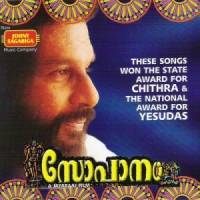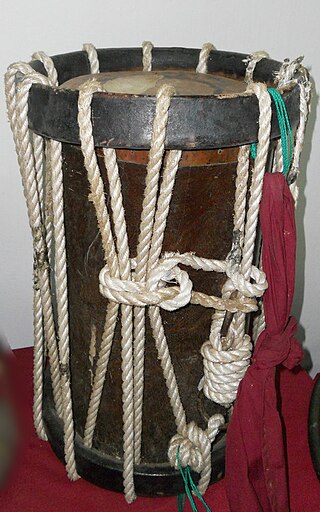Ashtapadis or Ashtapadi refers to the Sanskrit hymns of the Gita Govinda, composed by Jayadeva in the 12th century. The ashtapadis, which describe the beauty of Lord Krishna and the love between Krishna and the gopis, are considered a masterpiece in esoteric spirituality and the theme of 'Divine romance'. The literal meaning of ashtapathi, 'eight-steps', refers to the fact that each hymn is made of eight couplets. It is also the source of the word ashtāpada, an Indian board game, the forerunner of chess. Although the original tunes of the ashtapadis were lost in history, they remain popular and are widely sung in a variety of tunes, and used in classical dance performances, across India. Ashtapadis are regularly performed at Kerala temples in the accompaniment of an idakka; a genre of music called sopana sangeetham.

The Gita Govinda is a work composed by the 12th-century Hindu poet, Jayadeva. It describes the relationship between Krishna, Radha and gopis of Vrindavan.

The Malayali people are a Dravidian ethnolinguistic group originating from the present-day state of Kerala in India, occupying its southwestern Malabar coast. They are predominantly native speakers of the Malayalam language, one of the six Classical languages in India. The state of Kerala was created in 1956 through the States Reorganisation Act. Prior to that, since the 1800s existed the Kingdom of Cochin, the Kingdom of Travancore, Malabar District, and South Canara of the British India. The Malabar District was annexed by the British through the Third Mysore War (1790–92) from Tipu Sultan. Before that, the Malabar District was under various kingdoms including the Zamorins of Calicut, Kingdom of Tanur, Arakkal kingdom, Kolathunadu, Valluvanad, and Palakkad Rajas.

The Sabarimala Sree Ayyappan Temple is a Hindu temple complex located on the Sabarimala hill inside the Periyar Tiger Reserve, Ranni-Perunad Village, Ranni Taluk, Pathanamthitta district, Kerala, India. It is one of the largest annual pilgrimage sites in the world, with an estimate of over 10 to 15 million devotees visiting every year. The temple is dedicated to a Hindu Brahmachari (celibate) deity named Ayyappan also known as Dharma Shasta, who, according to one belief, is the son of Shiva and Vishnu. Sabarimala Temple exemplifies the convergence of diverse religions in India.

The music of Kerala has a long and rich history. It is not the same as Malayalam poetry, although most of it is poetry driven. Kerala has a rich tradition in Carnatic music. Songs formed a major part of early Malayalam literature, which traces its origin to the 9th century CE. The significance of music in the culture of Kerala can be established just by the fact that in Malayalam language, musical poetry was developed long before prose. With the development of music in the region, different branches were formed out of it.

Panchari Melam is a percussion ensemble, performed during temple festivals in Kerala, India. Panchari Melam, is one of the major forms of Chenda Melam, and is the best-known and most popular in the kshetram vadyam genre. Panchari Melam, comprising instruments like Chenda, Ilathalam, Kombu and Kuzhal, is performed during many temple festivals in central Kerala, where it is presented in arguably the most classical manner. Panchari is also traditionally performed, albeit with a touch of subtle regional difference, in north Kerala (Malabar) and south-central Kerala (Kochi). Of late, its charm has led to its performance even in temples in Kerala's deep south.
Thayambaka or tayambaka is a type of solo chenda performance that developed in the south Indian state of Kerala, in which the main player at the centre improvises rhythmically on the beats of half-a-dozen or a few more chenda and ilathalam players around.
Neralattu Rama Poduval or Njaralathu Rama Poduval (1916–1996) was an exponent of the ashtapadi/sopanam music form practised in Kerala in southern India. A recipient of the Kendra Sangeet Natak Akademi Award, he hailed from a rugged village called Thiruvaazhaamkunnu, near Mannarkkad in Palakkad district and lived most of life in Angadipuram in Malappuram district, the place famous for the Thirumanthamkunnu Temple.

The Aranmula Parthasarathy Temple is a Hindu temple located near Aranmula, a village in Pathanamthitta District, Kerala, South India. It is dedicated to the God Krishna, an avatar of Vishnu, who is worshipped as Parthasarathy. Constructed in the Kerala style of architecture, it is one of the "Divya Desams", the 108 temples of Vishnu revered by the Alvar saints.
Marar,, is the name given to the caste of hereditary temple musicians of Travancore, Cochin and Malabar region in the state of Kerala, whose primary duty was to provide the traditional temple Sopanam music. .They live in the vicinity of temples; and are related with the temples and temple customs. They belong to ambalavasi caste. Marar ladies are called Marasyar.
Ambalavasi, more properly Ampalavasi, is the generic name for a group of castes among Hindus in Kerala, India, who have traditionally rendered temple services.

Pallavur is a village situated in the Chittur Taluk, Palakkad district of Kerala, India. It is close to Kollengode Town, Nemmara and Koduvayur.

Thooval Kottaram is a 1996 Indian Malayalam-language romantic drama film directed by Sathyan Anthikad and written by A. K. Lohithadas. It stars Jayaram and Sukanya in the main roles. The music was composed by Johnson. The film won three Filmfare Awards South. The film was a commercial success, which ran for about 300 days in theatres. Jayaram won his first Kerala State Film Award, a Special Jury Award, for his role as Adv. Mohanachandra Poduval.
M A Krishnadas, also known as Tripunithura Krishnadas is an Indian musician. He is a well-known edaykkya and chenda artist from Kerala. He is the best edaykkya player of modern Kerala.

Peruvanam Kuttan Marar is a chenda artist. He leads several popular traditional orchestra performances in Kerala. He received Padma Shri, India's third highest civilian award, in 2011 for his contributions in the field of art.

Ilanjithara Melam is an assembly of percussion performance artists held at Ilanji tree at the courtyard of the Vadakkunnathan Temple in Thrissur city during the Thrissur Pooram. It is considered one of the best platforms for traditional Kerala music and the largest assembly of percussion artistes in any other Poorams. The Melam in technical exactness and instrumental discipline are the best example of Pandi Melam.

Sopanam is a 1993 Malayalam drama film directed by Jayaraj, starring J. V. Somayajulu, Manoj K. Jayan, Chippy in lead roles. Scripted by Kaithapram Damodaran Namboothiri, this film tells the story of a singer who loves his teacher's daughter.

Sadanam Divakara Marar was an Indian percussionist, known for his scholarship on sopana sangeetham, marappani, parisha vadhyam and thimila paani and his mastery over various temple and ritual percussion instruments of traditional Kerala music.
Pallavur Appu Marar (1928-2002) was an Indian percussionist, widely considered to be a maestro in the Pallavur (Palakkad) style of thayambaka, edakka, sopana sangeetham, melam and panchavadyam. He was the eldest of the three brothers, the other two being Pallavur Manian Marar and Pallavur Kunhikuttan Marar, who formed the famed Pallavur trio.
Kerala Sangeetha Nataka Akademi Award is an award given by the Kerala Sangeetha Nataka Akademi, an autonomous organisation for the encouragement, preservation, and documentation of the performing arts of Kerala, set up by the Department of Cultural Affairs of the Government of Kerala. Instituted in 1962, the awards are given in the categories of music, dance, theatre, other traditional arts, and for contribution/scholarship in performing arts. The award consists of Rs. 30,000, a citation and a plaque. The recipients of the award are also conferred the title Kalasree.











